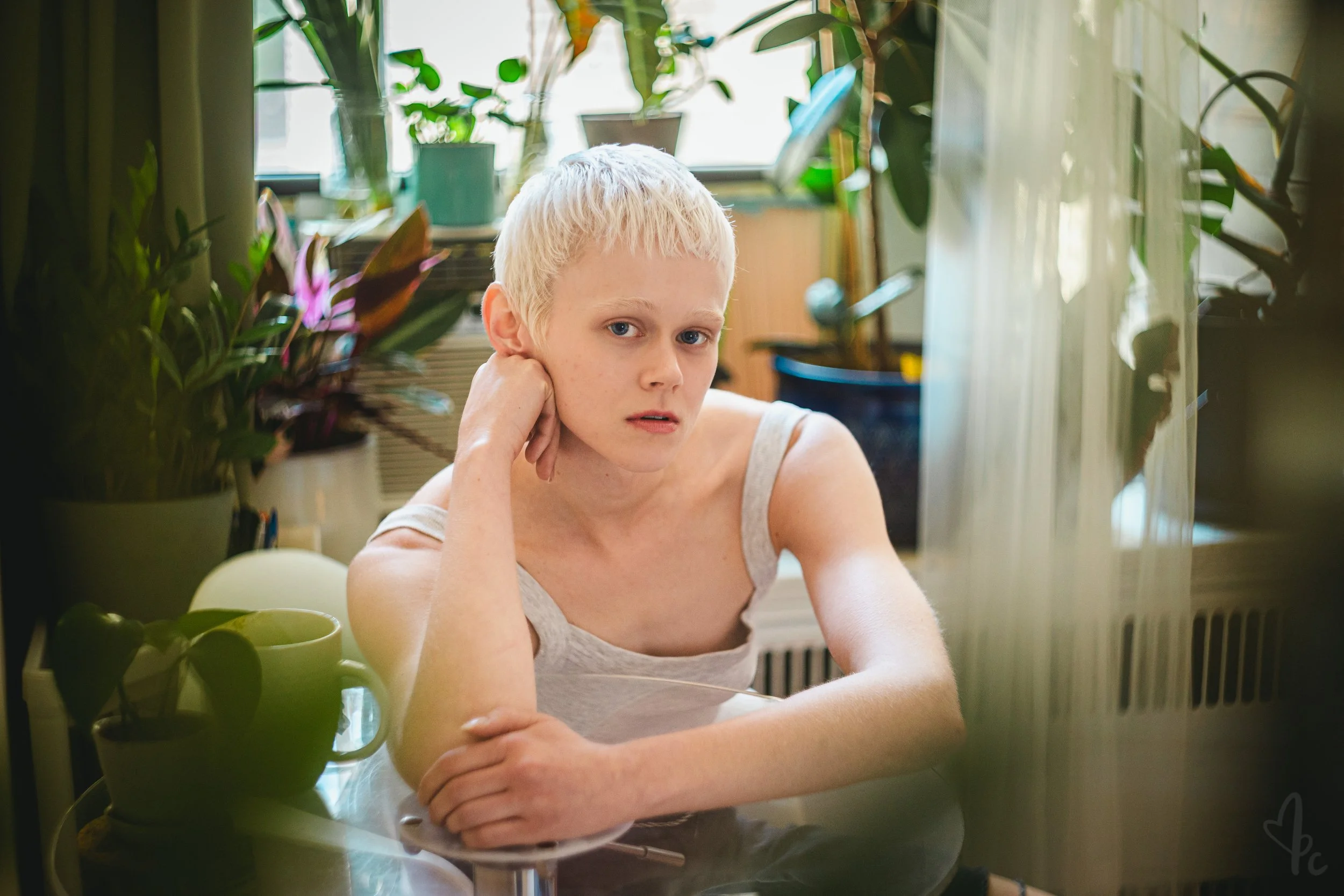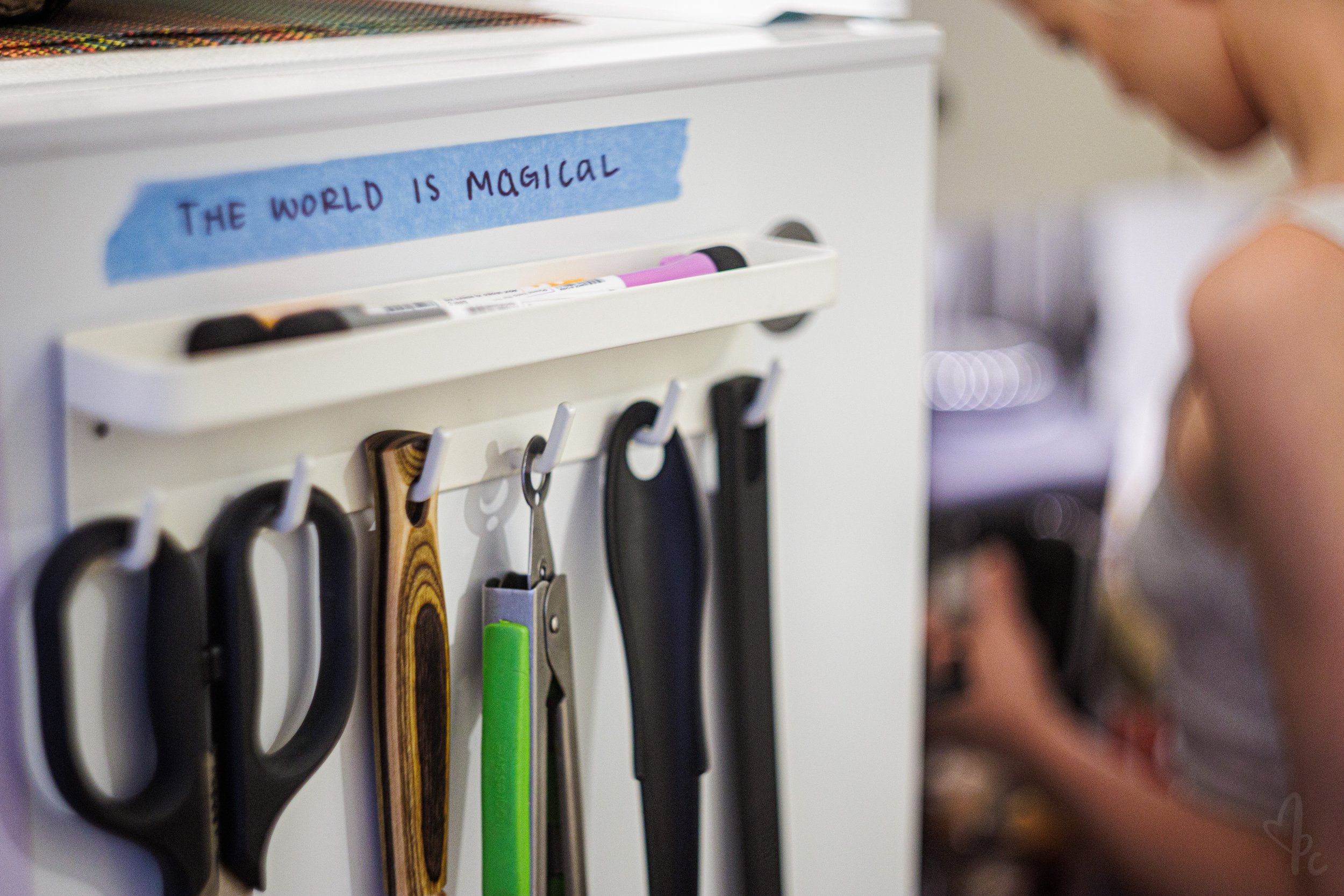Rio
Crown Heights, Brooklyn - 7/11/24
Author’s note: I met Rio on the street inside a little red toy car. We realized we lived in the same building and then developed a friendship.
Tell me your name, where you were born and where you live now.
00;03;26;06
Cool. my name is Rio. I use they / them pronouns. I was born in Saint Louis, Missouri in ‘96, and I live in Brooklyn or Lenapehoking .
Tell me about a piece of advice that you would give your younger self.
00;06;55;28
I feel like it would really come back to creativity and I would just tell my younger self - “Art is always going to be a part of your life in some way. You do not have to pursue art professionally to be an artist, but also you do not have to pursue one career.”
00;07;41;19
It’s almost like we live in a culture that forces this, like, abandonment. A society that forces you to abandon your creativity to survive, essentially.
So I've been really trying to get out of that survival mode and back into my artist and I would probably emphasize that to my younger self, who was just doing art because they wanted to.
Is there a quote that you resonate with?
00;12;09;16
Something my mom said to me probably when I was like 14 or 15. Along the lines of; ‘if you be kind, if you were always kind, use your gifts. and you try to love and be loved and allow yourself to be loved, then I'll always be proud of you.’ And I think it was in a moment of having a meltdown about grades and feeling like I wasn't doing good enough.
It shattered the idea that my parents expected me to be perfect.
And then later in life, I have to quote Octavia Butler - “All that you touch, You Change. All that you Change, Changes you.”
It gave me like a sense of grounding in that paradox of not needing to be perfect to make an impact.
The element of love in that first quote - of allowing people to love you - how does that resonate for you?
00;16;20;29
I think that love can be really uncontrollable … but there is sort of this element that's a little bit, can be, kind of challenging to let people feel for you, to let people show up… let people love you in the way that they can and want to.
00:18:18:01
A big part of my adulthood has been being okay accepting care, being okay accepting love and connection.
00:18:36:28
Allowing someone to see me cry and allowing someone to hold me without needing to hold them back—that’s terrifying and beautiful and important.
Where do you feel fully present, when does that anxiety drift away?
00:23:38:13
Modeling and acting—fully. When I step on set, my mind just clears. I’m in my body, in relationship with the photographer and the camera and the space. That’s when I feel most confident.
So much of acting is learning how to be present in your body and present with the other actor. If you can do that, you create believable scenes. If you’re in your head, it’s not good acting.”
What does childhood curiosity mean to you?
00:26:36:26
Childlike curiosity means unshameful, unhinged curiosity—curiosity without shame. When we’re children, it’s encouraged. Then at a certain point, we’re told: continue being curious, but be curious in this way.”
As I’ve learned to heal my inner child, I’ve learned to embrace curiosity while trying to release that shame.
And how do you nurture that and protect that?
00:27:28:29
It’s really important for me to do things that have no clear purpose—to just do things for the sake of exploration. Releasing the need for productivity.
Do you ever feel like you wake up and you’re like, alright, I’m just not trying to get out of bed today? What motivates you to get up eventually?
00:31:02:09
I definitely have those days. I was diagnosed with depression when I was like 20, but probably I’ve been struggling with it since I was 14 or 15. I take medication for it on and off—I’m on it at the moment. I’m a big believer that if it needs to be, it needs to be.”
00:31:29:17
I call it my capitalism coping pills because, you know what? In an ideal world, I’d be able to do all these other things I’m about to name—but I don’t always have the capacity or resources to do them, and I have to get to work.”
00:31:51:16
Sometimes people need medication. And community is a big one. I’ll often phone a friend or family member, or try to write. I’m working on reaching out for emotional support, and that’s been really beneficial. I have a friend I’m learning to feel comfortable crying in front of.
“Trauma lives in the body. But I think there are ways to heal from it and find ways to feel empowered again.”
What is a way in which you’re proud of yourself?
00:34:54:00
I’m proud of my values. I definitely struggle with anxiety around different parts of my personhood. I’ve noticed this is common among neurodivergent and queer people—this fear that you’re a horrible person and everyone’s just pretending you’re good. But I know I prioritize my values, maybe even too much.
00:38:12:19
I’m proud of my community. I’m so proud of the people in my life—and that says something about me. We are who we surround ourselves with. I feel so blessed.
What does community mean to you?
00:38:38:22
I’ve been thinking about community a lot. Doing this exercise called pod mapping—where you draw yourself in the center, then your close people, then potential connections. It’s about where I feel most seen and heard, and where I can put more effort in.
00:39:26:28
Community is so important. It’s both a necessity and a privilege. I’m learning to notice where I feel good—and if I don’t, asking why I’m still in that space.
00:42:19:28
Not everyone needs to have access to every part of you. That’s one of the ways I’ve learned to avoid burnout—by picking and choosing who I support, how much energy I have, and in what ways I can show up.
What’s your favorite thing about you?
01:04:48:27
My favorite thing right now is probably my capacity for love. I just really love love—and loving on people and being loved in every sense of the word.























